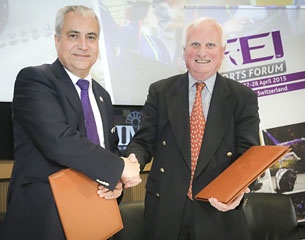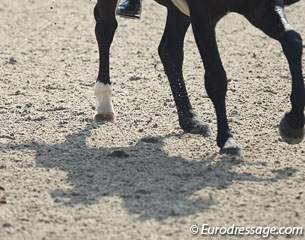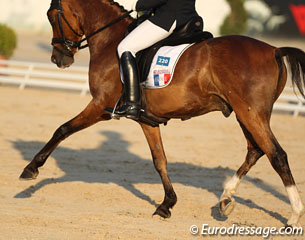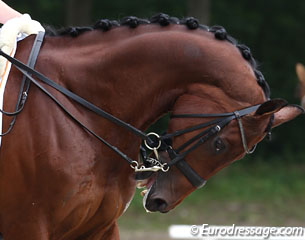
Dr. Hanfried Haring provided the concluding speech on the role of Europe in global equestrian governance at the 2017 WBFSH seminar on "The Horse's Perspective" in Gothenburg, Sweden on 22 August 2017.
The WBFSH seminar was held in co-operation with the Swedish Equestrian Federation (SvRF), European Equestrian Federation (EEF), and Swedish University of Agricultural Sciences (SLU) and facilitated by Göran Dalin and Elisabeth Lundholm.
The purpose of the seminar was to ensure that horse sport will remain relevant in our society and to build a platform for future cooperation between stakeholders of the equestrian world – i.e. in sport, breeding and science. It is important that public perception of the horse and its uses are not negative and that horse welfare is respected and safeguarded.
Dr. Hanfried Haring, President European Equestrian Federation (EEF)
The Role of Europe in Global Equestrian Governance
There are 2 main reasons why Europe plays such a vital role in global equestrian governance:
1. The enormous concentration of international equestrian sport within Europe:
- 1.5 million competitors participating in national events
- 2 million registered horses (about 500,000 in equestrian sport, 1.1 million for recreational sport or riding)
- Between 6-9 million horses in Europe - Worldwide about 60 million horses, 43 million donkeys and 11 million mules
- 4200 International events take place worldwide (60% in Europe)
- European Equestrian sport has a turnover €50 billion (excluding racing)
- 1 million full time jobs in Europe
2. The economic importance of the horse
Historically the relationship between man and horse has always been special. It has been used for centuries for work and as a companion. In the past no questions were raised regarding how the horse is used, what methods are applied. But this has changed drastically especially within Europe in the last 3 or 4 decades. On the one hand this is welcome, as animal welfare is paramount. But trends are leaning increasingly towards the right that man has to “use” the horse.
 These perceptions about all animals, not just horses, has a major impact on society. In some countries vegetarianism is increasing by 10%/year. Vegan cook books are becoming best-sellers. Zoos are closing down, and in most circuses these days there are no longer any animals.
These perceptions about all animals, not just horses, has a major impact on society. In some countries vegetarianism is increasing by 10%/year. Vegan cook books are becoming best-sellers. Zoos are closing down, and in most circuses these days there are no longer any animals.
In 2015 in Buenos Aires Sandra, a 31-year-old orangutan, was the first animal on earth to be declared by a court as a non-human person with justiciable rights. This illustrates the importance that is being placed on animal welfare in this day and age.
For generations, the horse world has been caught up in old traditions and ways of thinking. But it is no longer just us, the horse people, who decide what is right and what is wrong. The pressure from society on the treatment of animals and also of horses is increasing. Up to a certain extent this is very necessary and useful.
However, it sometimes seems that the motivation for stricter rules & regulations does not stem from the love of our animals, but results in making the keeping of horses so complicated and expensive that people are losing interest and giving up horses. Much pressure from society, media and public relations and many arguments are based on an emotional relationship to the horse, that almost humanise the horse. But in Dr Haring’s words, “We do not serve our partner, the horse, if we look at him or to him as a human. The Horse is an animal – a very special animal – and it deserves to be treated like this, ... like an animal.” One of our most important tasks is to act responsibly on these perceptions.
There are 2 main reasons for offences against horse welfare, which pose a large problem to the sport and the horse in terms of public relations.
1. Lack of knowledge
We no longer live in a world where the knowledge about the needs of a horse is passed down from generation to generation. The majority of people who are interested in or own horses do not come from a horse-background. It is the experience of many federations that this group of people wants to learn and has the will to spend time and money in order to do the best for their horse. It is the duty of the leaders in the equestrian world to support this, by providing scientifically proven knowledge through education and training.
On the basis of proven knowledge, with training methods for instance, the experience from generations can be used in combination with adaptations to our modern world. Considering the infamous issue of Rollkur and how to handle it, it is important to invest in the expertise of ethologists, veterinarians and scientific knowledge of anatomy & physiology.
 All of us should be investing to gain and improve our knowledge: Riders, equestrian federations, breed societies, the list goes on. Also, Farmers’ Associations – “horses are an agricultural product”. But further to that, horses are a rural and a green product. It is important that this is maintained in the Common Agricultural Policy which the EU is currently revising (as also mentioned during Mark Wentein’s presentation).
All of us should be investing to gain and improve our knowledge: Riders, equestrian federations, breed societies, the list goes on. Also, Farmers’ Associations – “horses are an agricultural product”. But further to that, horses are a rural and a green product. It is important that this is maintained in the Common Agricultural Policy which the EU is currently revising (as also mentioned during Mark Wentein’s presentation).
To reclassify the horse from an agricultural product to a pet will have a detrimental consequence. All sectors in the equine industry need to be active to defend the role of the horse, as a knock to one sector will influence other sectors too (racing, showing, equestrian sport, leisure, production etc.) One of the best examples where different stakeholders (equestrian federations, riders, animal welfare organisations, etc.) in the industry stood together was in the 1990’s regarding the crueltransportation circumstances of slaughter horses from Eastern Europe to Italy and France. Yet in the end, the riders and equestrian federations were in the spotlight for treating their horses badly.
2. Wilful disregard:
Since most horses in Europe are kept for sports purposes, the issue of wilful disregard and “not caring” is one of the biggest challenges for the European equestrian sports organisations.
 In principle, the organisations have all the necessary tools and are well structured from regional and national level to EU (EEF) and international level (FEI). Each level has good rules in place and there is consensus that the rules need regular review and modification if necessary, in order to maintain horse welfare and for the sport not to lose its social license. Yet between the rules and reality is the human, with all his strength and weaknesses. So, the strict enforcement of the rules is necessary, and where the rules are broken, there is a very good & effective judicial system in place, that will wake up even the “not-most-intelligent” rider when he is suddenly banned for 2 years. Doping or Anti-Doping – some time ago there were intense discussions between Europe and USA regarding which medications are permitted in sport. Europe won this debate and the decision was that no medication is permitted in competition. The anti-doping system is expensive but worth its price.
In principle, the organisations have all the necessary tools and are well structured from regional and national level to EU (EEF) and international level (FEI). Each level has good rules in place and there is consensus that the rules need regular review and modification if necessary, in order to maintain horse welfare and for the sport not to lose its social license. Yet between the rules and reality is the human, with all his strength and weaknesses. So, the strict enforcement of the rules is necessary, and where the rules are broken, there is a very good & effective judicial system in place, that will wake up even the “not-most-intelligent” rider when he is suddenly banned for 2 years. Doping or Anti-Doping – some time ago there were intense discussions between Europe and USA regarding which medications are permitted in sport. Europe won this debate and the decision was that no medication is permitted in competition. The anti-doping system is expensive but worth its price.
In conclusion:
- We should follow the motto of the FEI which is printed in all schedules “The Welfare of the Horse is paramount”
- Europe has a special situation and responsibility
- We have to accept the changing relationship of society with the animal
- We have to hinder humanisation of the horse
- We have to create facts regarding utilisation of the horse based on experience and proven by scientific research and knowledge. These agreed facts have to be followed without compromise, using all existing instruments to educate and if needed to punish wilful disregard or criminal intent.
Related Links
2017 WBFSH Seminar "The Horse's Perspective" on Training Surfaces and Lameness Assessment